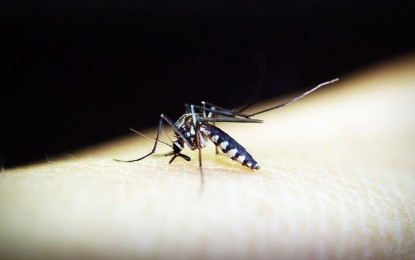
A photo of a dengue-carrying Aedes aegypti mosquito. (File photo)
TACLOBAN CITY – Eastern Visayas recorded an increase in cases of influenza-like illnesses and dengue fever in January, prompting the Department of Health (DOH) to remind the public to observe preventive measures.
DOH 8 (Eastern Visayas) information officer Jelyn Lopez-Malibago, in a media interview Tuesday, said 968 cases of flu-like illnesses associated with fever, cough, and sore throat were recorded in the region from Jan. 1 to 27, higher than the 541 cases in the first four weeks of 2023.
Similarly, dengue cases rose to 614 in January from 406 cases recorded in the same month last year.
Dengue fever, an illness caused by the bite of an infected Aedes aegypti mosquito, is marked by the onset of sudden high fever, severe headache, and pain behind the eyes, muscles, and joints.
“This season of ‘amihan’ (northeast monsoon), a continuous influx of heavy rain is expected in various parts of Eastern Visayas. Because of this, we remind the public of the health risks associated with it, such as the possible increase of cases of these diseases here in the region,” Malibago said.
To prevent influenza-like illnesses, the DOH reminded the public to minimize contact with a person who has cough and influenza, avoid crowded places, cover the mouth and nose when sneezing or coughing to prevent the spread of the virus, wash hands frequently with soap and water, have adequate rest, increase intake of oral fluids and nutritious foods, and take paracetamol for fever.
As part of dengue fever prevention, Malibago advised the public to apply the “4S” strategy -- search and destroy mosquito-breeding places, seek early consultation when signs of dengue occur, secure self-protection methods, and support fogging and spraying only in hotspot areas where an increase in cases is registered for two consecutive weeks to prevent an outbreak. (PNA)
